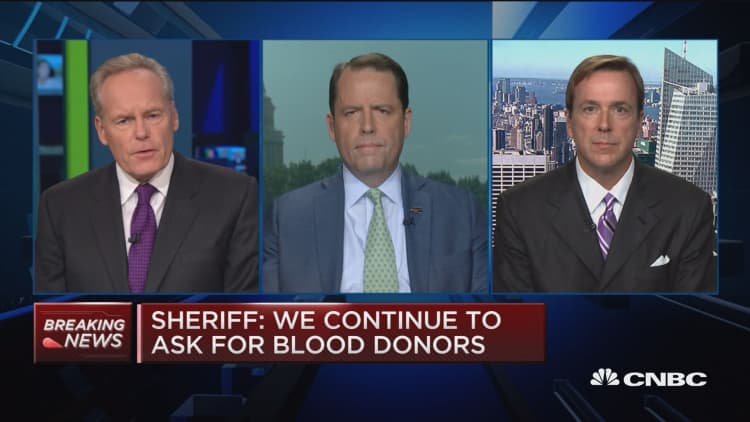
The attack on concertgoers in Las Vegas could lead to a shift in security practices at open-air events and hotels, experts said Monday, as law enforcement continues to determine the details of the deadly incident.
At least 58 people died and more than 500 were sent to hospitals after a gunman opened fire at the Route 91 Harvest country music festival, police said. The suspect, identified as Stephen Paddock, 64, of Mesquite, Nevada, allegedly shot at festival attendees from a hotel room on the 32nd floor of the nearby Mandalay Bay hotel.
The attack will spur some immediate changes to security protocols, said Bruce McIndoe, president of iJet International, which performs as many as 400 hotel security audits globally each year.
McIndoe said in an interview that it is likely that hotels will train their security surveillance staff to scrutinize customers with items such as fishing gear, skis and other long, thin items that could be rifles.
Manuel Gomez, a former FBI agent, told CNBC that security professionals would likely reconsider future events taking place at outside venues near high-rise buildings.
"The answer is to not put hundreds of people in an area where you have hotels or you have other venues that have not been screened or are not secure," said Gomez, who's now president of MG Security Services. "We learned a very hard way that these open-area events are not safe."
Audrey Cronin, former director of the Center for Security Policy Studies at George Mason University, said in an email that the details of the Las Vegas shooting were "horrifying," but not unprecedented, in terms of a mass shooter killing a large number of people from a tall structure nearby.
She pointed to the 1966 shooting at the University of Texas, in which Charles Whitman killed 15 people by firing from the observation tower in the center of the campus.
"It took police more than an hour to end the incident, and they learned a great deal from that," said Cronin, now a professor in the School of International Service at American University. That shooting is sometimes credited with leading to the creation of university police departments.
Cronin said that while it is typical for law enforcement to control access to nearby high places before major political events, the shooting could lead to expanded security measures for other types of gatherings.
"The question is whether that practice will have to be expanded to non-political situations. Yes, it may include changes to hotel security practices," she wrote. "Unfortunately, our law enforcement practices often must adapt in the wake of major tragedies."
In the bigger scope of security, McIndoe said that even some low-risk hotels may now consider baggage screening and metal detectors as the industry conducts a "rethink."
Still, McIndoe says those kinds of major security changes are unlikely because of the costs it would inflict on the hotel business model, particularly for Las Vegas properties that are connected to casinos.
He does not expect the type of sweeping changes made to the transportation sector after the Sept. 11 terrorist attacks.
"Now, it's not going to be like TSA," he said, referring to the Transportation Security Administration. "That's just not going to happen. It would very much disrupt the whole commerce model for a hotel property."
Even metal detectors are unthinkable for some venues.
"No, it's not going to work. It's never been done; it never will be done," Fred Del Marva, a casino and hotel security consultant, said in an interview.
According to McIndoe, the rapid response from local law enforcement actually suggested that the security procedures taken by police were successful.
"The security measures that are in place especially in Vegas worked," he said. McIndoe noted that Las Vegas has a 24-hour standing SWAT team and that it was able to neutralize the alleged shooter quickly. Had that not been the case, he said, there would have been a far higher death toll.
"That doesn't minimize the fact that a lot of people died," he said.
WATCH: No way to eliminate security risks in free society



